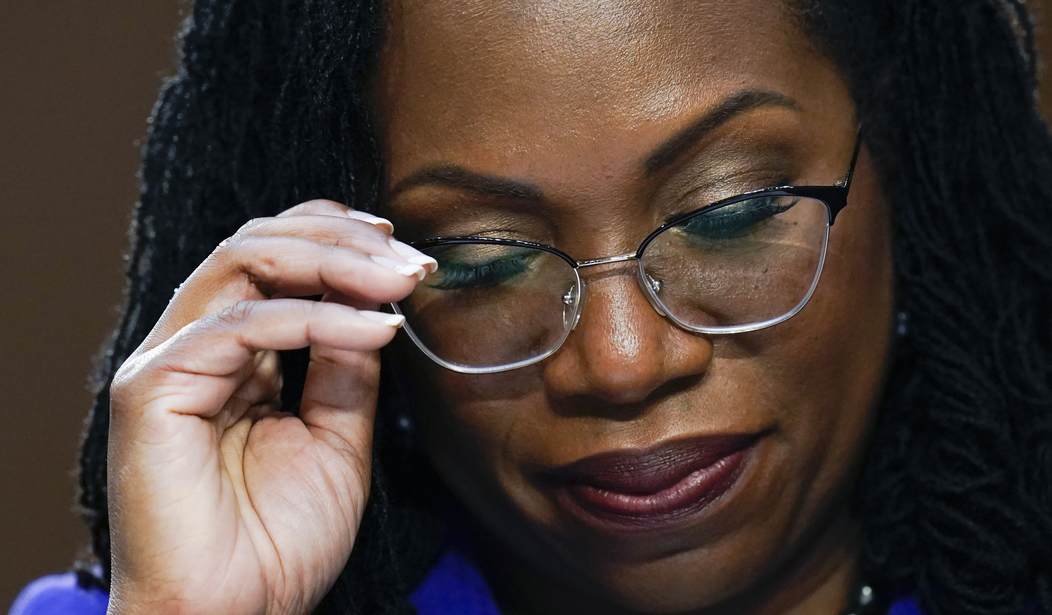If a criminal figures out a more effective way to break into people’s homes to steal more, should he receive a lighter sentence per dollar of what he steals? Biden’s nominee for the U.S. Supreme Court, Judge Ketanji Brown Jackson, certainly thinks so.
The legal system doesn’t normally work that way. If a rapist rapes two women, he gets two sentences, one for each crime. Each crime a criminal gets convicted for gets a separate penalty. That has traditionally been true for child pornography, where more pictures of children mean crimes have been committed.
In testimony before the Senate Judiciary Committee on Tuesday, Jackson discussed concerns raised primarily by Senator Josh Hawley (R-MO) that she was lenient on people who had child pornography. Hawley pointed out that as a judge, there were seven cases where she gave sentences below what was recommended by the federal sentencing guidelines. As a member of the U.S. Sentencing Commission, she also pushed to lower the penalties for child pornography.
“More serious child pornography offenders were based on the volume, based on the number of photographs that they received in the mail, and that made total sense before when we didn’t have the internet, when we didn’t have the distribution,” Jackson explained. “But the way that the guideline is now structured, based on that set of circumstances, is leading to extreme disparities in the system because it is so easy for people to get volumes of this kind of material now by computers.”
Recommended
The sentencing guidelines help ensure that two criminals who commit the same crime face the same prison term. Jackson claims that a criminal getting 100 child porn pictures through the mail is less harmful than getting 100 pictures on his computer over the internet. The point of the penalties is to discourage pedophiles from getting more pictures because taking pictures harms children. The greater the demand for those pictures, the more children are harmed.
Indeed, Jackson acknowledged this in her answer: “There is only a market because there are lookers. You are contributing to child sex abuse.” But she doesn’t understand where this answer logically takes her. Whether someone pays for an electronic image of child porn or has a printed copy of that picture, they increase the demand.
She claimed that she viewed the crime of child pornography as “damaging,” as “horrible.” But consistently deviating from the sentencing norm established by the guidelines for child porn doesn’t match Jackson’s words.
ABC News came to Jackson’s defense by using Biden administration talking points to note that Senator Hawley had voted for circuit court nominees who, as district court judges, had sentenced criminals below the guidelines for child porn cases. But there is a problem with this claim. Judges will once in a long while deviate from the sentencing guidelines. Indeed, most judges have probably done it a couple or a few times out of the hundreds of cases that they have heard because there might be unusual circumstances that might auger for either stiffer or more lenient sentencing. Republican judges probably do this much less often than Democrat ones. But going through all the circuit court judges that Hawley has voted for and finding a few cases doesn’t prove what ABC thinks it does.
Trump got 174 district court and 54 circuit court judges confirmed. Of all those judges, “An ABC News review of federal judges appointed and confirmed during the Trump administration found nearly a dozen had handed down below-guideline sentences in cases of defendants viewing, possessing, transporting or distributing child pornography.” Suppose that “nearly a dozen” means eleven judges – that is still just 4.8% of the judges that Trump placed on the bench. Undoubtedly, ABC provides no information on exactly the number of cases that handful of judges sentenced below the guidelines for a broad range of pornography cases. For many of that eleven, it could be just one case each.
What is clear is that Jackson is an outlier. For her to do it seven times truly distinguishes her.
Of course, no one should be surprised by Jackson’s record on sentencing. Jackson was a public defender, and they tend to be very liberal. A very liberal president appointed her. Activist organizations on the left strongly support her.
The irony is that with violent crime soaring and Democrats facing backlash over cutting police funds and left-wing District Attorneys refusing to prosecute violent criminals, Democrats are just now wanting to claim that they are not soft on crime. Yet, while Biden and Democrats say one thing, they nominate and vote for a Supreme Court justice who continues their soft on crime policies.
Lott is the president of the Crime Prevention Research Center. He is a former chief economist for the United States Sentencing Commission and until January 2021 he was a senior advisor for research and statistics at the U.S. Department of Justice.

























Join the conversation as a VIP Member